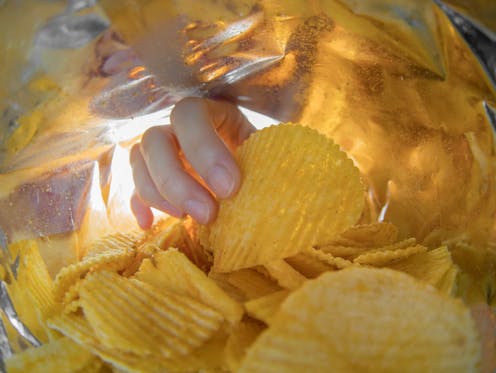
Obesity is a growing problem among young people in the UK. In 2020-21, 40.9% of year six children (age 10-11) were measured as overweight or obese. Research shows that childhood obesity increases the likelihood of living with obesity as an adult.
Frequent snacking on foods high in fat, salt and sugar, such as crisps and chocolate bars, may be one factor contributing to high obesity rates. The UK government recommends that snack foods like this should be eaten rarely and only in small amounts as part of a healthy diet.
But when we surveyed 252 11 and 12-year-old students at two English secondary schools to understand the perceived social norms for snacking on foods high in fat, salt and sugar, we found that students often overestimated the extent to which other students ate this kind of snack. We’ve also found that what their peers do appears to heavily influence how young people eat.
We used these results to find a way to reduce snacking among children, by informing them of this misconception.
Snacking habits
A 2019 study found that teens classified as overweight or obese ate more snacks which were high in salt, fat and sugar daily than those who were normal weight.
Our research started by trying to understand what influences young people’s diets through focus group discussions. We found that young people aged 11 and 12 viewed their fellow students as strong influences on what they should be eating, and that they could be teased for eating more healthily.
We then focused on addressing misperceptions of social norms as a way to change the young people’s snacking behaviour. Perceived social norms are the unwritten rules or expectations that guide what we personally think or do based on what we think most other people think or do.
Challenging misconceptions
An approach based on social norms works by correcting these misperceptions between perceived and actual behaviour. Our research group has used this approach to address other health behaviour, such as attitudes towards vaccine uptake and understanding university students’ use of alcohol and other drugs. No studies had yet used this approach to understand snacking behaviour in students starting secondary school.

We found that, on average, students aged 11 and 12 overestimated how many snacks high in salt, fat or sugar their peers ate by 3.2 snack portions a day. We then developed a campaign, based at a school, to challenge these assumptions.
Students designed posters for display in their school. These featured information from the survey data we collected, showing that the students consumed fewer snacks than the common perception. We developed the campaign together with students and teachers. Based on their suggestions, we ran a competition where students voted for the best posters to be displayed around the school.
We found that the 163 students who took part in the campaign were less likely to overestimate their peers’ attitudes to snacking, compared with students at another school who formed a control group. After three months, students at the school where we ran the campaign ate fewer snacks high in fat, salt and sugar, and had less positive attitudes towards snacking on these foods, compared with the control group.
Understanding beliefs around social norms, as well as involving young people in tackling misperceptions, can offer one way to help tackle the growing problem of obesity in children and teenagers.
The authors do not work for, consult, own shares in or receive funding from any company or organisation that would benefit from this article, and have disclosed no relevant affiliations beyond their academic appointment.
This article was originally published on The Conversation. Read the original article.







